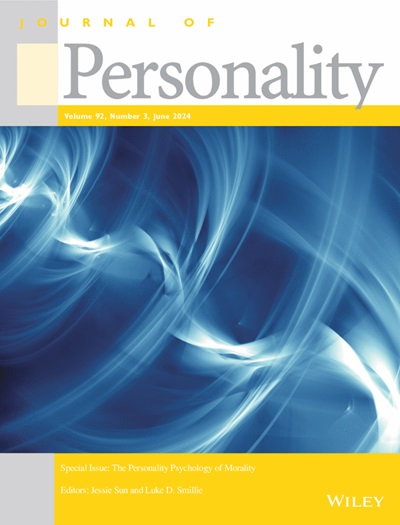From Affect to Values: A Lexical Approach.
IF 2.7
1区 心理学
Q1 Psychology
引用次数: 0
Abstract
INTRODUCTION Personal values act as guiding principles in life and are thought to be connected to affective experiences; however, past research has primarily examined the direction from values to affect rather than the reverse. This study identified theoretical frameworks suggesting a causal pathway from affect to values and tested this pathway using a lexical approach. METHODS Study 1 (N = 230) developed and validated a Chinese Personal Values Dictionary (CPVD) to assess personal values in Chinese texts, revealing meaningful correlations between self-report values and those identified through the CPVD. Using the CPVD, Study 1 also investigated the relationship between past affect and values with cross-sectional data (N = 230), while Study 2 analyzed real-time panel data from social media (N = 14,020) during the COVID-19 pandemic. RESULTS Results indicated that individuals with positive affect tended to prioritize anxiety-free values (openness to change and self-transcendence), suggesting that positive affect fosters a commitment to the greater good, independence, novelty, and personal growth. In contrast, anxiety-related values (conservation and self-enhancement) displayed a more intricate relationship with affective experiences, indicating that the mechanisms underlying value development extend beyond mere anxiety-related factors. CONCLUSION This research offers valuable insights into how affective experiences contribute to value development through a lexical approach.从情感到价值观:一种词汇方法。
个人价值观是生活中的指导原则,被认为与情感体验有关;然而,过去的研究主要是研究从价值观到影响的方向,而不是相反。本研究确定了从情感到价值观的因果路径的理论框架,并使用词汇方法对这一路径进行了测试。方法研究1 (N = 230)开发并验证了汉语个人价值观词典(CPVD)来评估汉语文本中的个人价值观,揭示了自我报告价值观与通过CPVD识别的价值观之间有意义的相关性。使用CPVD,研究1还使用横截面数据(N = 230)调查了过去的影响与价值之间的关系,而研究2分析了2019冠状病毒病大流行期间社交媒体的实时面板数据(N = 14020)。结果结果表明,具有积极情感的个体倾向于优先考虑无焦虑的价值观(对变化的开放和自我超越),这表明积极情感促进了对更大利益、独立性、新颖性和个人成长的承诺。相比之下,焦虑相关价值观(保守和自我提升)与情感体验的关系更为复杂,表明价值观发展的机制不仅仅是焦虑相关因素。结论本研究对情感体验如何通过词汇方法促进价值发展提供了有价值的见解。
本文章由计算机程序翻译,如有差异,请以英文原文为准。
求助全文
约1分钟内获得全文
求助全文
来源期刊

Journal of Personality
PSYCHOLOGY, SOCIAL-
CiteScore
9.60
自引率
6.00%
发文量
100
期刊介绍:
Journal of Personality publishes scientific investigations in the field of personality. It focuses particularly on personality and behavior dynamics, personality development, and individual differences in the cognitive, affective, and interpersonal domains. The journal reflects and stimulates interest in the growth of new theoretical and methodological approaches in personality psychology.
 求助内容:
求助内容: 应助结果提醒方式:
应助结果提醒方式:


